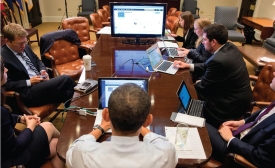twiplomacy
Andreas Sandre, noted author and diplomat, discusses the evolving role of new media in public diplomacy, and the need for innovation in both foreign policy strategies and diplomatic activities.
Formerly derided as the domain of time-wasting and self-obsession, social media has emerged as an unlikely shining light for international relations and social activism.
Formerly derided as the domain of time-wasting and self-obsession, social media has emerged as an unlikely shining light for international relations and social activism.
Listen to this PRI interview with former Mexican Ambassador Sarukhan who was among the very first successful digital diplomats to use Twitter extensively in his post.

Andreas Sandre, in his recent book, Digital Diplomacy: Conversations on Innovation in Foreign Policy, sheds light on the evolving practice of digital diplomacy in the 21st century. Sandre presents potential challenges and opportunities that all diplomats now face in using digital media and new technologies.
This video highlights some of the key findings of Burson-Marsteller's Annual Twiplomacy Study which was recently updated to look more specifically at the connections between heads of state and governments and foreign ministers, covering a record 161 countries and 643 Twitter accounts.
Prime Minister Stephen Harper’s government is turning to social media in an effort to engage in online diplomacy, practice “open policy development” and improve international trade ties. The government is also looking to Twitter and other social media to retool what it acknowledges has been a “closed” diplomacy and policy model that “emphasized control over information and access,” show newly released federal documents.







